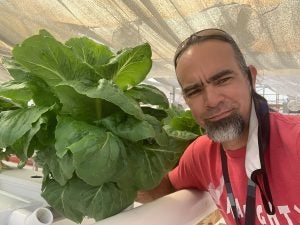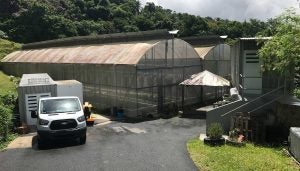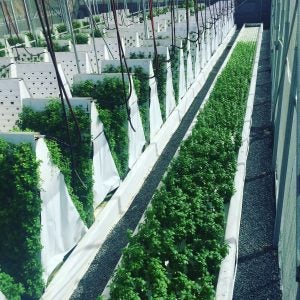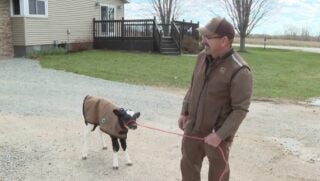When Hurricane Maria raged in the Caribbean in the fall of 2017, many Puerto Ricans lost their homes, livelihoods, and were faced with incredibly difficult circumstances. Pedro Casas Cordero, a native to the island, endured this life-changing natural disaster. As one of the first aquaponic horticultural producers in this U.S. territory, Cordero lost nearly his entire business operation, and he faced an overwhelming amount of debt that he did not see a way to repay.
Despite taking out insurance for his company, Agroponicos Inc., the policy did not cover damages due to natural disasters, which meant he had no way to bail himself out of the circumstances that had befallen him. The Category 5 hurricane left thousands of people dead and caused more than $91 billion in damage, and Cordero felt hopeless and discouraged, thinking that his prospects for a career in the agricultural sector was grim.
Without the necessary money to rebuild, Cordero took a leap of faith in deciding to move to the United States, where he was offered an opportunity in agriculture that he never saw himself headed toward.

Today, Cordero is the lead greenhouse technician and a faculty member for Santa Fe Community College’s Controlled Environmental Agriculture program. Cordero did not envision this future for himself — he had very little interest in agriculture as a child, and did not think that he would leave his home to forge a new career in New Mexico. Originally a graphic designer, Cordero obtained a Bachelor in Fine Arts. It wasn’t until the birth of his first child that Cordero began thinking about agriculture and food systems, when he thought about the kinds of food he wanted to provide for his child.
A family member gifted him a tutorial class in organic farming, and it was here that his interest and passion for agriculture really bloomed.
After taking the class, Cordero began cultivating a rooftop garden in his home in Puerto Rico, but his graphic design job took up too much time for him to properly tend to his plants. Determined to provide fresh produce for his family, he switched to hydroponic gardening (a soilless water-based system) after extensive research, which he believed would require less time to manage. However, he realized quickly that buying the nutrients to sustain his hydroponic system was not financially sustainable and again made a switch — this time to aquaponics (a closed loop system of farming in which waste water from raising fish is used to grow vegetables in a hydroponic system).
From there, his rooftop garden began flourishing. As he gained more success, Cordero pursued formal training in aquaponics from the University of the Virgin Islands and launched a full-time career in aquaponic farming in 2012 — one of the first for the island.
As he began his new career, Cordero experienced a wide range of successes and setbacks. While he began with cultivating lettuce, chives, and tomatoes, he quickly added mint and cilantro to his operations to serve the demand from his local community. He began his operations without a greenhouse, and quickly learned that an open environment led to pest infestations, so he had to take out loans to build a proper facility for his operations.
With tenacity and passion, Cordero finally began to turn a profit several years into his venture, and he was becoming a distributor for not only his own product but other hydroponic growers in his area.

Unfortunately, when Hurricane Maria struck the region, it decimated his greenhouse operations. His greenhouse was almost completely demolished, and with no capital to rebuild, Cordero knew he had to pivot. His passion for agriculture was not lost, but he knew that the risk of operating in Puerto Rico with hurricane occurrences was too big of a risk to take again. With looming debt and a family to provide for, Cordero’s connections from the University of the Virgin Islands reached out to him with a new opportunity: an educational role at the Santa Fe Community College, where he could teach students about aquaponic/hydroponic systems.
As a professor, Cordero found a passion in mentoring and teaching students interested in agriculture. When the college established a greenhouse operation for students to gain hands-on experience, Cordero saw an opportunity to both engage in his craft while mentoring the next generation of growers.
Now, Cordero sees his failed business venture as a valuable learning lesson that he can teach to his students — that launching a business is a risk, but there is always a way to channel your passion into new and unexpected avenues. When asked about his students, Cordero notes that his students are “innovative, and keen to ‘fix’ things; they want to be more modern in how they farm,” and he tries to instill his belief that the future of agriculture will entail a hybrid blend of traditional soil farming and hydro/aquaponics. Cordero is excited to see such diversity in his students, who vary in ethnicities, age, and walks of life.

He believes in providing this next generation of growers with strong mentorship and advice from older, more experienced growers such as himself so they don’t run into the same mistakes and problems that he faced when he attempted to launch his own agricultural business.
Cordero’s journey into the agricultural industry was nontraditional and fraught with dilemmas, but by following his curiosity and passion, he was able to forge a unique and necessary role for himself in the sector.
Though he never thought that he would be a teacher, let alone one in the agricultural industry, it is a role that he highly values and is honored to be able to fill. While it’s important to highlight successful ventures in agriculture, it’s also equally important to recognize failures and advocate the hard lessons learned from them.
Liza Thuy Nguyen serves as the 2023 American Farmland Trust Agriculture Communications Intern at AGDAILY, with a focus on helping to amplify diversity and minority voices in agriculture. Liza is originally from Anaheim, California, and attended the University of California, Davis, as a first-generation college student. She received a bachelor’s degree in genetics and genomics and went on to earn a master’s in horticulture from Penn State.





